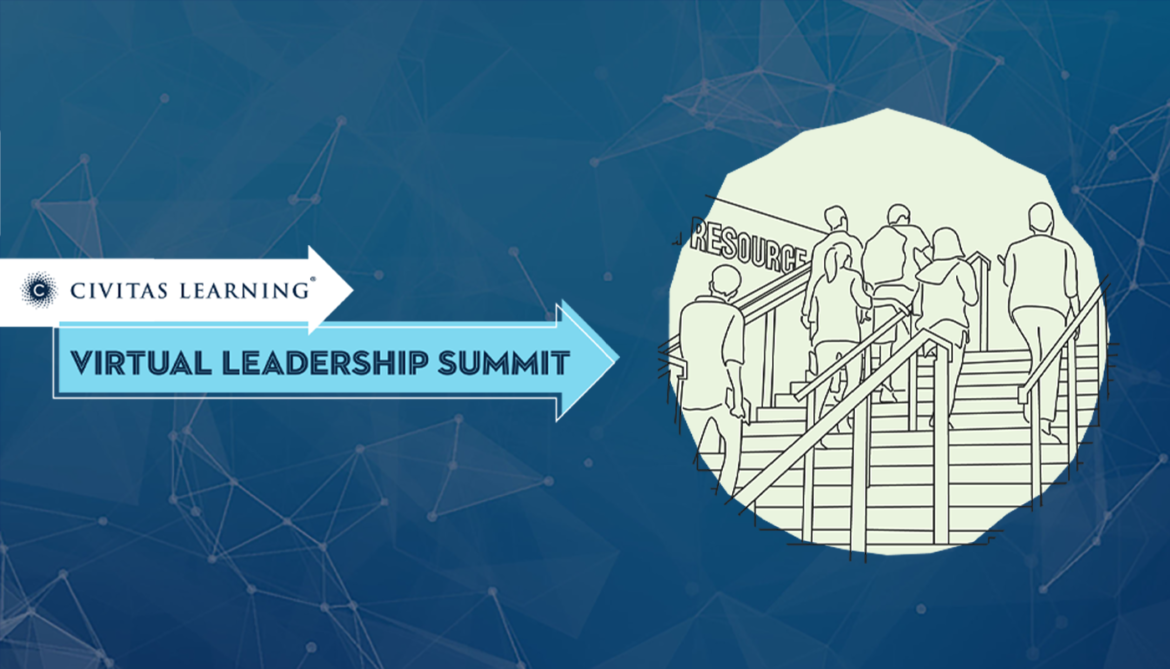Insights from the Civitas Learning® 2021 Virtual Leadership Summit
Leaders and experts from across our community of practice gathered to explore ways to reimagine student success in the aftermath of the covid-19 pandemic. Over the last year, educators worked hard to ensure academic continuity and provide holistic support as their students grappled with barriers to success amplified by the pandemic, economic instability, and systemic racism.
Now higher ed professionals are considering which pandemic-era policies should become standard student success practices on their campuses. Here are three approaches that rose to the top of the list during our 2021 Virtual Leadership Summit:
- Build Equitable & Inclusive Campuses Where All Students Can Thrive
- Make Student Success a Team Effort
- Reconsider Status Quo Structures & Systems
Approach 1.
Build Equitable & Inclusive Campuses Where All Students Can Thrive
Creating diverse, inclusive, and equitable colleges and universities that empower students to succeed is a top priority for leaders across our partner institutions. In his keynote address, internationally recognized social justice educator, lecturer, and consultant Vernon Wall encouraged participants to begin diversity, equity, and inclusion work on their campuses by first doing the personal work of unpacking their own identities.
He reminds us that we must first understand who we are before we begin creating programs on our campuses. By unpacking how privilege and marginalization show up in our own lives we are better able to create spaces that build understanding and identify the systems in place that are marginalizing others. He encourages us to ask what rules, regulations, and policies are creating barriers for students with historically marginalized identities.
Additionally, during our panel discussion, Dr. Gangaram Singh, Provost of National University challenged us to drive more equitable outcomes for our students by providing them more personalized student experiences that match their academic goals. He argues that personalized experiences that honor students’ existing knowledge and allow for different definitions of completion can better serve a diverse student population.
Leaders and experts are working to find data-informed, creative solutions to help students from diverse backgrounds thrive in a higher ed environment. Continuing to find ways to diagnose, create, and adapt policies and programs to meet the needs of each student is a critical component of this work.
Approach 2.
Make Student Success a Team Effort
As institutions quickly transitioned to remote learning our partners found that students responded best to outreach from people they felt connected to. In many cases, this person was a faculty member because they were the most consistent touchpoints for students in a remote learning environment. This shift in how students were interacting with institutions magnified the reality that student success is everyone’s responsibility, not just student affairs.
Our partners also shared that students need more than academic support. Although many colleges and universities had robust student support services before the pandemic, these services generally focused on supporting a student’s academic success and rarely addressed more widespread personal concerns.
To ensure as many students as possible were able to remain enrolled during the pandemic, many institutions implemented or extended services to address critical challenges like food insecurity, financial hardship, childcare needs, and access to technology. From preliminary data, several of our partners report that these types of wraparound services positively impacted overall student outcomes.
Leaders need systems and tools in place to not only evaluate the efficacy of programs and policies but also identify how these pieces work together to drive student success. Involving faculty in student success work, providing holistic, wraparound student support services, and leveraging data and analytics all played significant roles in helping students succeed over the last year.
Approach 3.
Reconsider Status Quo Structures & Systems
An infusion of federal funding from the Coronavirus Aid, Relief, and Economic Security Act (CARES) and Higher Education Emergency Relief Fund (HEERF) has allowed colleges and universities to carefully assess which student success practices to invest in now.
Our panelists, Dr. Gangaram Singh, Provost of National University, and Terry Brown, Vice President for Academic Innovation and Transformation at AASCU encourage leaders to consider investing their CARES and HEERF funds in transformational student-centered changes rather than to simply plug holes or maintain status quo policies and programs.
They remind us that this is a once-in-a-generation opportunity to think creatively about how higher education can better serve students. In a resource-constrained environment where holistic student support matters more than ever before, the ability to disaggregate data to build targeted and scalable practices is a top priority. Our panelists urge leaders to strongly consider using a strong data infrastructure to find ways to use their federal funding to invest in supporting faculty, providing holistic academic advising, creating comprehensive and inclusive student experiences, and investing in effective degree mapping solutions.
Partners talked extensively about reexamining status quo practices and making data-informed decisions rather than simply “rolling over” customary policies, practices, and programs. They invite us to shed 20th-century models that may no longer work and replace them with data-informed ideas that meet the needs of today’s students.
These are just a few of the ways higher ed leaders and experts are reimagining the future of student success. If you’re interested in exploring even more ideas on ways to use your data to scale student success and improve student outcomes watch the full sessions from the 2021 Virtual Leadership Summit on demand.





